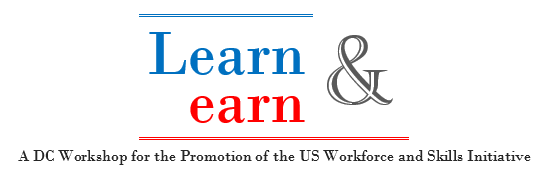Learn & Earn
What is the institutional structure of vocational training in Germany? What makes it unique? What challenges does this system face? The participants of the AGI working group “Learn & Earn: A Young Leaders’ Group for the Development of the U.S. Workforce” had the chance to ask these questions to Dr. Achim Dercks, Deputy Chief Executive Officer of the Association of German Chambers of Industry and Commerce, at the Representative of German Industry + Trade (RGIT) on October 1, 2014.
Despite recent developments toward more university education in Europe, the European financial crisis revived the interest in German vocational training. While other European countries struggled with high youth unemployment rates, the German system proved to be far more resilient to economic downturns. At this point, 1.4 million apprentices are participating in the two to three year programs, with 500,000 new trainees starting every year. This successful practice involves 450,000 companies, 300,000 instructors trained by the Chamber, and 160,000 examiners.
The German apprenticeship system involves the Chambers of Industry and Commerce (IHKs) as the competent bodies by German law to develop the curriculum, the training of the “in-company” trainers and examiners, the trainees themselves, and the examinations. As membership in chambers is mandatory for German companies, IHKs function as mediating and overarching umbrella organizations. German vocational training involves three parties: The company, the trainee, and the Berufsschule (vocational school). For three to four days a week, trainees are “learning by doing” in their companies on the basis of national curricula and a contract between the company and the trainee. The third party is the Berufsschule, which students attend for one to two days a week. This provides them with the necessary theoretical framework and knowledge that they can apply to their workplace.
This system benefits all parties involved: The companies receive skilled workers and have low recruitment costs. The trainees themselves receive a starting salary and acquire qualifications and skills for their professional career. Since the German industry invests nearly €27 billion a year in vocational training, the German state only needs to cover €4 billion in expenses and has the lowest youth unemployment rate in Europe.
Dr. Dercks summarized the main functions of the chambers as follows:
- Balance the interests of stakeholders
- Mediate between employers, trainees, and the Berufsschule
- Register the training contracts
- Monitor and conduct the centralized examination processes across Germany
- Promote qualification of trainers within companies
- Assist companies that want to start vocational training for the first time
The five key elements of the IHK’s work are the following:
- Involve companies in the system and curriculum
- Promote the Dual System (school and job)
- Qualify trainers in the company and teachers in the school
- Assure quality throughout the entire training process
- Secure the employability and comparability of all trainees
During the discussion with Dr. Dercks, he pointed out that vocational training serves as a general qualification that is not limited to the specific job or company at hand. Dr. Dercks further explained that German trainees are not required to stay with their company after they have finished their education. This system works in Germany, since young people are less mobile and have high interest in staying with their company. Participants in the discussion noticed this striking difference to the U.S. labor market, which is highly mobile and competitive. Furthermore, efforts to integrate young immigrants have had little success due to unfamiliarity with the training system and language barriers. Even though vocational training provides great chances for social mobility, the system also faces serious challenges in the future, such as attracting young people to science, technology, and engineering.
 Information about the working group:
Information about the working group:
The American-German Institute (AGI) at Johns Hopkins has been working on bringing together a number of different actors concerned with workforce development in the U.S. to encourage sharing of ideas, learning lessons from different countries, seeing what challenges lay ahead, and where further cooperation is needed to encourage public-private partnerships towards promoting specialized skills training opportunities.
“Learn & Earn” is a working group of young professionals from a variety of different sectors and backgrounds (energy, education, finance, industry, manufacturing, etc.) that gather monthly to discuss the role of workforce training in economic development around the world.
At our first meeting in June 2014, we welcomed Robert Dehm from the German Embassy’s Economic Department. He presented the German Embassy’s Skills Initiative. At the second meeting in July we heard from Zach Boren, Senior Advisor at the U.S. Department of Labor’s Office of Apprenticeships on how they are trying to brand apprenticeships to an American audience. In August we heard from Max Grünig, Senior Fellow of Ecologic about the growth of green industry in Europe and the U.S. and how that has spurred growth of apprenticeship programs in that field. And in September we welcomed Katie Gage from Enstitute who talked about her nonprofit organization and the challenges they run into in recruiting young applicants.
Please tweet any relevant articles using #learnandearn, or feel free to post any articles that might be relevant to the LinkedIn group “Learn & Earn: A Young Leaders’ Group for the Development of the U.S. Workforce.”
Location
RGIT
1776 I Street, N.W. Suite 1000 Washington, DC 20006 United States






